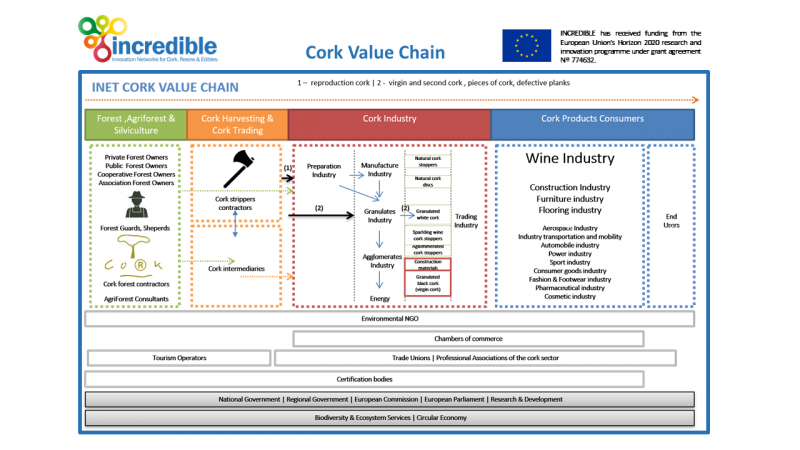Roadmap
In the cork production, the greatest peculiarity is that cork is harvested in periods of 9–14 years without cutting the tree (cork oak, Quercus suber) and therefore without the need to modify the forest structure. In Portugal and southern Spain, cork is typically produced in open, multifunctional agroforestry systems stands (montados and dehesas), which also produce other products and ecosystem services with very high cultural heritage values. In other regions, Catalonia, Mediterranean France, the isles of Corsica and Sardinia and the Southern Mediterranean, cork is produced mainly in closed forest stands. In both systems, cork production is a main source of income. The manufacturing of stoppers is the most important use in economic terms, ensuring a vital role in maintaining the economic value of cork and the low intensity use of cork oak forests. However, there is an increasingly large portfolio of construction and other manufacturing materials produced with cork that are gaining relevance in the bottom line of cork processing companies. New markets related to sustainable construction and the transport and aerospace industries could uptake more cork products if those where available at competitive prices. However, these new applications cannot make today a profitable business model in the absence of quality stoppers that still represent some 70% of the total industrial turn-over.
As a typical Mediterranean forest ecosystem, cork oak forests are significantly affected by climate change. Many cork forests are scarcely managed but a significant area is now under less favourable conditions regarding its productive potential, reflecting overexploitation and inappropriate management practices due to lack of knowledge. Such factors in certain cases also contribute to put at risk the sustainability of the entire value chain. In addition, the long period for investment recovery, the relatively high cost of labour and low profitability for forest managers, the fragmentation of owners and the lack of innovation culture among forest owners and managers does not favour the desirable correction of these imbalances in the value chain.
During the celebration of the Scoping Seminars, some work sessions were held to identify the priority themes to focus Cork iNet actions:
- Climate change adaptation and cork oak decline (7 votes)
- Evaluation of Ecosystem services (life cycle approach) (6 votes)
- Profitability (6 votes)
- Policies targeted on multifunctional (3 votes)
- Communication (to consumer, to research, … (3 votes)
For three of these main themes the results of the sessions were:
A) EVALUATION OF ECOSYSTEM SERVICES
Type: Management and innovation challenge
Desired state: A set of management models suitable for different conditions available; Balancing different ES, achieving synergies among ES; Delivery of ES is rewarded and profitable
What needs to happen: research based identification of models; assessment of feasibility of proposed models (stakeholder engagement); assessment of ES within each management model (quantifying synergies and trade-off)
Actions/ Role for INCREDIBLE: providing a rating system associated to different ES performances;
B) PROFITABILITY
Type:
Technological challenge – mechanical cork harvesting; cork extraction and transport logistics;
Organizational challenge – negotiation power increase
Policy challenge related to ES payment regulation
Business model challenge
Desired state:
Decrease costs; 30% cork mechanically debarked; new marketing strategies;
Increase profits; payments for ES are normal; dynamic and innovative sector; workers training; transparent market trading
What needs to happen: improve funding to implement the R&D agenda; expand cork quality sampling; develop a humidity sampling methodology; financial schemes to support plantation (attractive and adequate); cork market platform expansion.
Actions/ Role for INCREDIBLE: document and share relevant cases; workshop organization about the relevant cases; dissemination event (include field discussions); cross seminar cork oak x rural development; content review NWFP training necessities; training school meetings; e-tools development: webinar; practical tutorials videos)
C) CLIMATE CHANGE
Type: Management and innovation challenge - facing the effects of climate change, decrease in precipitation, increase in temperature and of extreme events, and with the fact that cork oak is a slow response system/specie.
Desired state: resilient ecosystem services from cork oak systems
What needs to happen: more adaptive management at a spatial and temporal scale (no unique management solution)
Actions/ Role for INCREDIBLE:
- Awareness of public decision-makers for the need for long term research
- Analysis and integration of existing information and good practices for dissemination for forest owners
- Promote research and knowledge transfer cooperation among cork oak stakeholders.

About
The INCREDIBLE project aims to show how Non-Wood Forest Products (NWFP) can play an important role in supporting sustainable forest management and rural development, by creating networks to share and exchange knowledge and expertise. ‘Innovation Networks of Cork, Resins and Edibles in the Mediterranean basin’ (INCREDIBLE) promotes cross-sectoral collaboration and innovation to highlight the value and potential of NWFPs in the region.
Funding
 ‘Innovation Networks of Cork, Resins and Edibles in the Mediterranean basin’ (INCREDIBLE) project receives funding from the European Commission’s Horizon 2020 programme under grant agreement Nº 774632
‘Innovation Networks of Cork, Resins and Edibles in the Mediterranean basin’ (INCREDIBLE) project receives funding from the European Commission’s Horizon 2020 programme under grant agreement Nº 774632
Contact
Email: info@incredibleforest.net or use the contact form.
We welcome your feedback!






